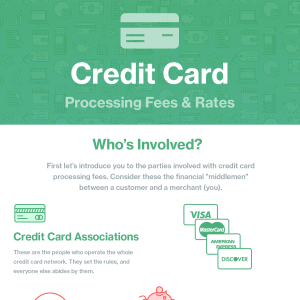As a payment service provider, PayPal differs considerably from a merchant accounts provider, though which one is best for your business may depend on your sales volume and risk level.
Our content reflects the editorial opinions of our experts. While our site makes money through
referral partnerships, we only partner with companies that meet our standards for quality, as outlined in our independent
rating and scoring system.
PayPal is not a merchant account provider.
PayPal is a third-party processor — also known as a payment service provider (PSP) or an aggregator — which aggregates all of its seller accounts into one large merchant account. Lumping your account with those of millions of other businesses reduces PayPal’s risk and makes it quick and easy to get a PayPal account.
A merchant account, by contrast, involves a detailed underwriting of your business so the provider can set you up with your own dedicated merchant account.
Merchant accounts take longer to obtain and charge more administrative fees than PayPal. However, a merchant account is more stable than a PayPal account, and will usually offer superior customer service and lower transaction fees.
Keep reading to learn more about the differences between PayPal and a merchant account.
PayPal vs. A Merchant Account: Key Differences For Businesses
Merchant accounts differ from payment service providers like PayPal and Stripe in a number of ways, but the main difference is that with a merchant account, your business is more heavily scrutinized before you can get approved for an account. You’ll have to provide a lot of paperwork, perhaps undergo a credit check, and you’ll be waiting much longer to get approved than you will with a PayPal Business Account. Sounds like a hassle, right?
The upside of this is that having undergone extensive underwriting before you start taking payments, your individual transactions are scrutinized much less heavily than they are with PayPal/Stripe/Square/etc.
This means that with a merchant account, your funds are much less likely to be held, and your account is much less likely to be frozen over any real or perceived issues with a single transaction.
PSPs, on the other hand, are practically infamous for freezing or even terminating accounts over a single large transaction that the processor’s algorithm flags as “suspicious.”
Here’s a big-picture look at the main differences businesses will find in the ongoing PayPal vs. a merchant account debate:
| PayPal Merchant Services |
Merchant Accounts |
| More cost-effective for occasional sellers & low-volume merchants |
More cost-effective for larger merchants |
| No long-term contract or early termination fee |
May include a long-term contract (typically 3 years) and an early termination fee (up to $500), but some providers offer month-to-month contracts without ETFs |
| Greater possibility of account holds/terminations |
Lower possibility of account holds/terminations |
| Non-personalized customer support |
Personalized customer support |
| All-in-one merchant services solution |
Included features vary by each merchant account provider |
| Can be offered as a supplementary payment method in your online store |
Cannot be offered as a supplementary payment method in your online store |
PayPal vs. Merchant Account Pricing: Which Is Cheaper?
PayPal has lower upfront costs than a merchant account, no monthly fees (for a basic account), and doesn’t charge you common merchant account fees such as PCI fees.
However, PayPal transaction fees — the portion of each sale the processor takes — are higher than those you’ll pay with a regular merchant account. This means as your processing volume increases, you will usually save money in transaction fees by using a traditional merchant account.
Generally, PayPal and other PSPs are more cost-effective for merchants processing less than $5,000/month, while those processing more than that can save money with a merchant account. However, this $5K/month “tipping point” can vary depending on your monthly processing volume, average ticket size, and other factors.
Here are some more need-to-knows about PayPal vs. merchant account pricing:
|
PayPal Business Account |
Merchant Account |
| Pricing Model |
Flat-rate pricing |
Tiered, interchange-plus, or membership |
| Monthly Fees |
$0 for a basic account |
Varies; typically at least $10/month |
| Typical Rates |
Ranges from 2.59% + $0.49 to 3.49% + $0.49 per online transaction; 2.29% + $0.09 per offline transaction Our PayPal pricing guide has the complete rundown. |
Varies, but nearly always lower on a per-transaction basis |
| Early Termination Fee/Cancellation Fee |
No |
Sometimes |
| Ideal For |
Smaller/occasional/low-volume merchants |
Larger/higher-volume merchants |
When To Choose PayPal Or A Merchant Account
Generally, PayPal is a better choice for occasional sellers and new, low-risk businesses than a full merchant account due to the relative ease of obtaining your account and beginning to accept payments.
However, larger sellers will save money over the long run by using a traditional merchant account.
Let’s discuss the types of businesses that should consider PayPal vs. those for whom a merchant account might make more sense.
Choose PayPal If…
- You sell only occasionally
- You are a lower-volume merchant (you process under $5,000/month)
- Your new business is just starting out
- You want the convenience of having such a vast array of features in one unified package
- You want to add PayPal buttons and/or payment links as payment options to your existing online store or other sales channels
Choose A Merchant Account If…
- Your established business has particular needs
- You are a mid- to high-volume seller (you process over $5,000/month)
- Your business belongs to a high-risk industry
- You want to lessen the risk of having your funds withheld or your account terminated
It’s important to note that even if you decide to go with a merchant account for the bulk of your sales, you can still use PayPal for specific purposes, such as sending out invoices or mobile sales at trade shows, while retaining your merchant account for everyday sales.
PayPal VS Merchant Account: The Final Verdict
Despite its drawbacks, PayPal is easy to sign up for and use, offers a huge range of services under one umbrella, and won’t soak you with various monthly and annual fees.
While there’s an inherent risk in using PayPal, it’s not guaranteed that you’ll encounter trouble and you can take steps to mitigate your risk and reduce the chances of an account hold or termination while using PayPal.
On the other hand, if you choose a merchant account, you could see lower rates and better reliability, as well as more personalized and responsive customer support. Plus, if you have a high-risk business, you may have no choice.
Finally, if you don’t think PayPal is right for your business, it’s important to know that a merchant account isn’t your only alternative. Check out our list of the best small business credit card processors, which offers both PSP and merchant account options.












